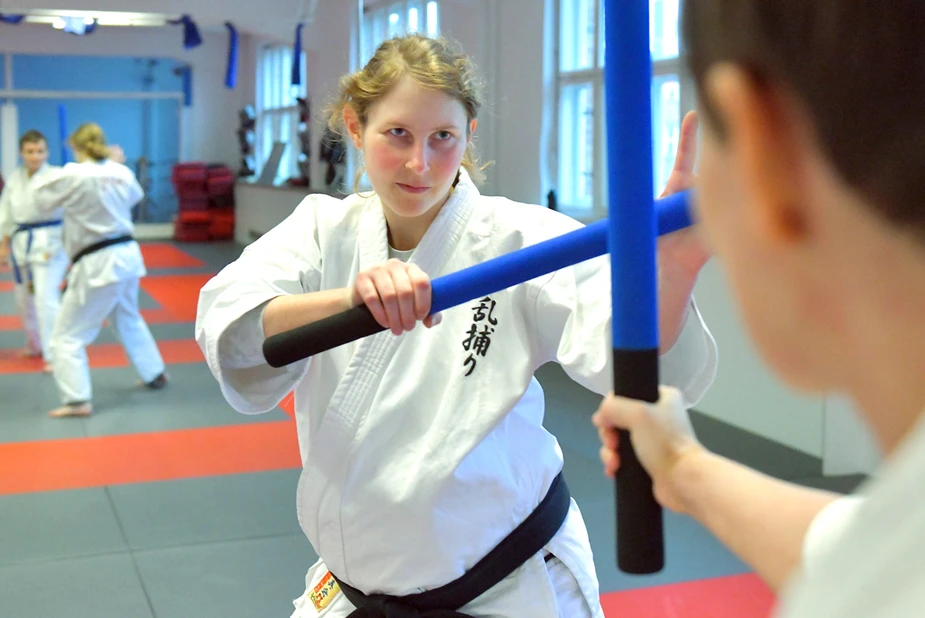Committed Advocate of Equal Opportunities
In conversation with Mara Oßwald, physicist and co-organizer of the conference „I, Scientist“
A passionate physicist, black belt martial artist and trainer, committed advocate of equal opportunities and a mother-to-be – Mara Oßwald is clearly full of girl power. It seems her day has more than 24 hours. The 28-year-old PhD student researches DNA repair processes after UV light damage at the Max Born Institute for Nonlinear Optics and Short Pulse Spectroscopy. In her spare time, she is busy organising the “I, Scientist” conference in Adlershof on 25-26th May. It focuses on gender, career paths and networking in the natural sciences and mathematics. In the following interview, she tells us why in times of female quotas and countless sponsorship programmes for women, it is more important than ever to overcome barriers and biases regarding women and equality.
What does career mean to you?
To accomplish the objectives that I have set for myself, while exploiting my full potential and attaining financial and personal satisfaction.
Gender is omnipresent in public debate. Do we need another conference?
Our generation feels that gender equality has been accomplished. There are many female advancement programmes. They are important but the way they are communicated is skewed. The image we project shouldn’t be: we must promote female advancement. It should be: we need equal chances for everyone.
So, the conference “I, Scientist” is open for everyone?
Yes, because gender equality is a social issue, not a women’s issue.
Despite their outstanding training, why do most female scientists opt for family instead of a career?
Unfortunately, there are still many structural and social barriers that make balancing work and family difficult. I also feel that us women inhibit ourselves. Our career is not deeply entrenched in our brains. There is a lack of female role models to inspire young people. We want to change this with our conference.
Who are “we”?
Presently we are 10 young female scientists from various institutes and universities. Six of us founded the Lise Meitner Society e.V. as the host organisation. “I, Scientist 2018” is our second conference. There will be workshops, a women-in-science science slam, keynotes and plenary debates as well as a career speed dating event and a job fair. The latter is still open for applications by companies and scientific institutes.
Are female physicists like exotic birds?
The fact is that the number of women in physics is much lower than the number of men. The proportion of female physics students, who enrolled at the Humboldt-Universität zu Berlin in 2009, was about 10 percent. However, that number goes up to 20 percent when you look at those completing a BA degree. The female recruitment problem in physics, among other sciences, must be tackled much earlier. The numbers in biology, for example, are very different. The decreasing proportion of women, the “leaky pipeline”, is striking.
What did you want to be when you were a child?
I was never a girly girl. Even when I was three years old, I preferred to play in the dirt and built things. I wanted to know how the world around me works early on, but it was during my a-levels when I realised that physics was everywhere. My physics teacher played a decisive role back then, otherwise I would’ve probably studied art or psychology.
What do you do in your spare time?
I’ve been doing ju-jitsu since I was eight. I have a black belt and train people of all ages. My other hobby is art. I like drawing and painting. Sadly, I only ever take out my drawing materials when I make birthday presents.
When did you last try something new?
I’m having a baby soon, so I’m busy preparing to be a mother. My boyfriend and I have just bought a baby changing table and we are already seeing our apartment changing.
How long is your parental leave?
After maternity leave, I will stay home for five months. Then my boyfriend will be taking over for six months.
What will happen to your volunteer work at the Lise Meitner Society?
I don’t plan on taking a break. I will take on specific tasks that allow me to work flexibly. And I will take the baby to the conference with me.
What will you do after your PhD?
I’m currently in a phase of self-discovery. I won’t be pursuing tenure, but I’m open to working in the private sector. I’m interested in research with a focus on application. I’m also thinking about going into management or coaching.
Interview by Sylvia Nitschke for Adlershof Journal
